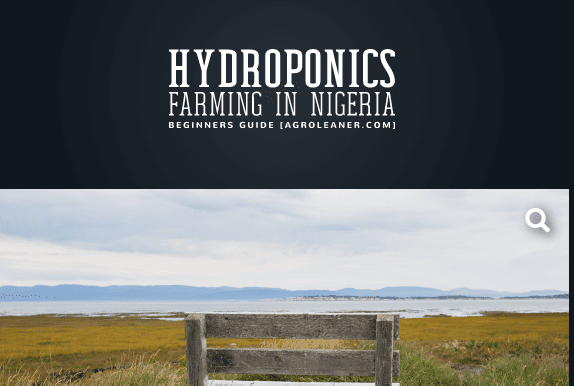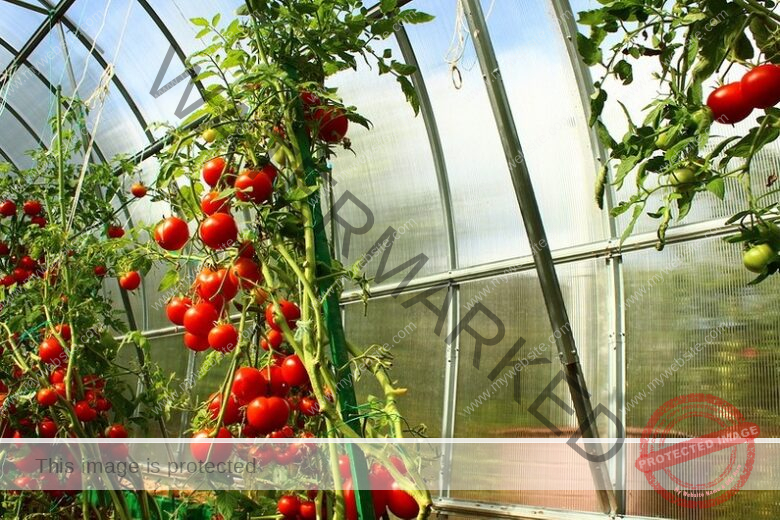Hydroponics farming is an emerging agricultural technique in Nigeria as well as in most countries around the world that is gaining popularity due to its potential to increase crop yield, reduce water usage and increase food security.
Hydroponics is a method of growing plants without soil, instead, plants are grown in a nutrient-rich solution and a growing medium such as sand, gravel, or coconut husks.
The nutrient solution is provided to the plants directly, eliminating the need for traditional soil-based agriculture and paving the way for a more sustainable agriculture model.
Hydroponics farming has been proven to be a viable alternative to traditional farming methods in Nigeria, as it requires less water and less land, while still providing quality produce.
We have compiled this rich informative piece on hydroponics farming in Nigeria to enlighten you and teach you all that you need to know about hydroponics farming.
Hydroponics Farming in Nigeria PDF
Hydroponics farming is an important agricultural technique in Nigeria and is being adopted by farmers due to its potential to increase crop yield and improve food security. This farming process has proven to be a more cost-effective solution than traditional farming methods, as it requires the use of fewer resources and less labor.
Step 1. Research The Hydroponics Market In Nigeria
Learn about the hydroponics industry and its current trends in Nigeria. Research the types of hydroponics systems available and the costs associated with them. Research the types of crops that can be grown in a hydroponics system.
Step 2. Acquire The Necessary Materials And Equipment
Purchase the necessary materials and equipment needed to set up a hydroponics system in Nigeria. This includes a hydroponics system, growing containers, substrates, pumps, and other supplies.
Step 3. Determine Your Location
Choose a suitable location for your hydroponics farm in Nigeria. Consider factors such as access to electricity, water, and other resources.
Step 4. Start Growing
Once you have all the necessary materials and equipment in place, begin the process of planting your crops. Monitor the growth of the plants and adjust the hydroponics system accordingly.
Step 5. Monitor And Adjust
Monitor the growth of the plants daily and make adjustments to the hydroponics system if needed.
Step 6. Market Your Produce
Once the plants have matured, you can start marketing and selling your produce. Consider selling directly to local markets or wholesalers, or setting up an online store.
Hydroponics Farming Techniques in Nigeria
#1. Nutrient Film Technique (NFT)
This technique involves the solution of water and nutrients being circulated in a shallow film over the roots of the plants.
#2. Deep Water Culture (DWC):
This technique involves the roots of plants being suspended in a container of nutrient-rich water.
#3. Flood and Drain (ebb and flow)
This technique involves periodically flooding the root system with nutrient-rich water, and then draining it back out.
#4. Aeroponics
This technique involves the roots of the plants being suspended in the air and sprayed with nutrient-rich mist.
#5. Wick System
This technique involves the use of a wick system to deliver water and nutrients to the plant’s roots.
#6. Drip System
This technique involves the use of drippers to provide a continuous delivery of water and nutrients to the plants’ roots.
Benefits of Hydroponics Farming in Nigeria
Hydroponics farming has several advantages over traditional farming.
- It requires very little space and can be set up in small urban areas. This makes it particularly attractive to urban farmers who have limited space but still want to produce their food.
- Hydroponics farming does not require the use of pesticides or other chemical fertilizers. This makes it an eco-friendly and sustainable farming method.
- Hydroponics farming does not require the use of chemical fertilizers and pesticides, making it an environmentally friendly approach to growing crops. Using fewer chemicals reduces the risk of soil contamination and water pollution. It also helps to maintain a healthy ecosystem by preserving soil and water quality.
- Hydroponics farming could also help to create jobs in Nigeria. This method of farming requires less physical labor than traditional farming, allowing more people to be employed in the agricultural sector. This could create more economic opportunities and stimulate economic development in Nigeria.
- Hydroponics farming could help to improve food security in Nigeria. With increased yields and lower costs, more people will be able to afford to buy food.
- Plants grown in hydroponics systems can grow faster than those grown in traditional soil-based systems. This is because the nutrient-rich water solution is directly delivered to the plant roots, allowing for greater nutrient uptake and faster growth.
- This method of growing crops without soil has numerous benefits that could help to improve food security, reduce environmental pollution, and increase the economic well-being of Nigerians.
Disadvantages of Hydroponics Farming in Nigeria
#1. High Cost
Hydroponic farming requires a large initial investment, as well as ongoing maintenance costs. This is due to the specialized equipment and supplies needed to build and maintain a hydroponic system.
#2. Technical Knowledge Required
Hydroponic farming requires a good understanding of the hydroponic system and its components. Without detailed knowledge of the system and its components, it can be difficult to ensure successful crop production.
#3. Limited Number Of Crops
Hydroponic farming is only suitable for certain types of crops. Crops that require large amounts of water or those that require deep rooting are not suitable for hydroponic farming.
#4. Lack Of Agricultural Support
Due to its relative newness, hydroponic farming is not as widely accepted or supported as traditional farming methods. This can make access to financing, subsidies, and other services more difficult.
#5. Environmental Risks
Hydroponic farming involves the use of large amounts of water and nutrients, which can be harmful to the surrounding environment if not managed properly.
Challenges of Hydroponics Farming in Nigeria
Hydroponics farming is becoming increasingly popular in Nigeria as a means of growing crops without the use of soil. this farming technique uses nutrient-rich water and a mineral-based nutrient solution to provide the essential nutrients for plant growth. While hydroponics offers several benefits for farmers, it also presents several challenges.
Lack of Reliable Electricity
One of the major challenges of hydroponics farming in Nigeria is the lack of reliable access to electricity. Power outages and instability are common in Nigeria, making it difficult to keep hydroponic systems running. Despite the potential cost savings of hydroponics, farmers must invest in alternative energy sources, such as solar power, to ensure a consistent supply of electricity.
Cost Of Setting Up And Maintaining A Hydroponic System
Another challenge of hydroponics farming in Nigeria is the cost of setting up and maintaining a hydroponic system. Hydroponic systems are expensive to purchase and require a significant amount of maintenance to keep them running efficiently. This can be a burden for farmers with limited financial resources.
Higher Level Of Expertise And Labor
Hydroponic systems require a higher level of expertise and labor than traditional farming methods. Farmers must be knowledgeable about hydroponics and be able to troubleshoot any issues that may arise. This can be a challenge for rural farmers who may not have the necessary
Poor Crop Yield
Hydroponic systems require careful monitoring and maintenance. If the water level or nutrient solution is not correctly balanced, it can lead to poor crop yields.
Tips to Begin Hydroponics Farming in Nigeria
Hydroponics farming is a method of growing plants without soil. Instead of soil, it uses a nutrient-rich water solution to feed the plants. Hydroponic farming has become increasingly popular in Nigeria over the past few years due to its ability to produce higher yields with less water and fertilizer than traditional farming methods.
#1. Research
Researching is essential to understand the basics of hydroponic farming, the kind of crops that can be grown, and the necessary equipment and resources. It is important to understand the Nigerian climate and soil conditions and the most suitable crops for hydroponic farming.
#2. Equipment
Setting up a hydroponic farm requires a variety of equipment and resources. It is important to obtain the necessary equipment such as a nutrient solution, a growing medium, air pumps, and a water pump.
#3. Location
Location is a very important factor when establishing a hydroponic farm. It is important to choose a suitable location that has access to a water source and a stable electricity supply.
#4. Nutrient Solution
A nutrient solution is essential to sustain hydroponic plants. It contains all the essential nutrients and minerals that are necessary for healthy plant growth. It is important to purchase the right nutrient solution that is suitable for the Nigerian climate and soil conditions.
#5. Maintenance
Hydroponic farming requires regular maintenance and monitoring of the plants, equipment, and nutrient solutions. It is important to ensure that the nutrient solutions are provided regularly and that the plants are checked for signs of distress and growth.
#6. Investment
Hydroponic farming is a capital-intensive activity and requires substantial investment to set up the farm and purchase the necessary equipment and resources. It is important to have a clear understanding of the costs involved and to have a well-planned budget before establishing a hydroponic farm.
#7. Training
It is important to have adequate knowledge and understanding of hydroponic farming before attempting to establish a hydroponic farm. It is advisable to attend a training program that provides a comprehensive understanding of hydroponic farming.
#8. Networking
Establishing a hydroponic farm requires networking with local suppliers and farmers to purchase the necessary equipment, resources, and advice. It is important to build relationships and contacts that can help in the successful establishment of the hydroponic farm.
Hydroponic Farming Pdf
Hydroponic farming is a method of growing plants without soil, using mineral nutrient solutions in a water solvent. This form of agriculture has multiple advantages, including reduced water and nutrient usage, improved crop yields, and faster growth. It also requires less land, labor, and energy inputs, making it a cost-effective and productive form of farming.
Hydroponic Farming Business Plan Pdf
A Hydroponic Farming Business Plan Pdf should outline the objectives of the business, the strategies for achieving these objectives, the management structure, the financial plan, and the marketing plan.
Business Overview
This section should provide an overview of the business, including its mission and purpose, target market, and competitive advantages.
Market Analysis
This section should analyze the current and potential market for hydroponic farming, including trends, customer demographics, and potential competitors.
Objectives
The objectives of the business should include the desired production levels of crops, the desired profit margins, and the desired customer base.
Strategies
Strategies for achieving the objectives should include an analysis of the hydroponic farming market, the development of competitive advantage, and the implementation of necessary technology and infrastructure.
Management Structure
The management structure should outline the roles and responsibilities of the key personnel in the business, including the owners, managers, and employees.
Financial Plan
The financial plan should include a budget, a cash flow statement, and a financial statement analysis.
Marketing Plan
The marketing plan should include an analysis of the target market, the development of a marketing strategy, and the implementation of a comprehensive marketing campaign.
Operations Plan
This section should outline the operational processes and procedures that will be used to produce and deliver hydroponic farming products.
Financial Projections
This section should provide an overview of the projected financial performance of the business, including income statements, balance sheets, and cash flow statements.
Risk Management Plan
This section should detail the strategies and processes that will be used to mitigate the risks associated with the business.
Exit Strategy
This section should outline the strategies and tactics that will be used to exit the business when the time comes.
These elements should be included in a comprehensive Hydroponic Farming Business Plan Pdf, to ensure that the business is well-prepared to achieve its objectives.
What Is Hydroponics
Hydroponics is a modern agricultural method of growing plants without soil, using mineral nutrient solutions in water. Plants are placed in a nutrient-rich solution, which is then circulated to provide essential nutrients for plant growth.
Indoor Farming
Indoor farming is the practice of growing crops in a controlled environment such as a greenhouse, warehouse, or other indoor facility. It allows for year-round production, eliminates the need for pesticides, and can use less water than outdoor farming.
Hydroponic Vertical Garden
A hydroponic vertical garden is an efficient and space-saving way to grow plants without soil, using a nutrient-rich solution instead. Vertical gardens are ideal for small spaces and are easy to maintain and can help conserve water.
Hydroponic Lettuce
Hydroponic lettuce is grown using water and nutrient solutions, instead of soil. It is a sustainable and efficient way of growing lettuce that produces high yields in a shorter period than traditional soil-based agriculture.
Hydroponics Farming In Nigeria Pdf
Hydroponics farming is an increasingly popular form of agriculture in Nigeria, which uses nutrient-rich water instead of soil to grow crops. This method requires minimal land, water, and labor, making it an attractive option for farmers looking to maximize yields and reduce environmental impact.
With the right infrastructure and support, hydroponics farming in Nigeria could be a major force for economic and environmental sustainability.
How To Learn Hydroponic Farming
If you are interested in learning hydroponic farming, here are a few points you need to consider.
- Research hydroponic farming techniques and materials.
- Attend workshops and seminars to gain hands-on experience with hydroponic systems.
- Join a local hydroponic community group to gain further insight.
- Experiment with different hydroponic systems and growing media.
- Monitor and adjust nutrient levels and pH levels.
- Keep up to date with the latest hydroponic farming news and innovations.
How To Hydroponic Farming
Hydroponic farming is a method of growing plants without soil, using nutrient-rich water and other growing media. It is a sustainable and efficient way to grow plants indoors or outdoors.
To start hydroponic farming, you’ll need to choose a system, select a nutrient solution, and decide what type of growing media to use. You’ll also need to monitor your plants closely and adjust the nutrient solution to ensure optimal growth.
How To Become A Hydroponic Farmer
- Research hydroponic farming techniques and best practices.
- Acquire knowledge of hydroponic nutrients, lighting, and other requirements.
- Identify suitable space for a hydroponic farm.
- Source and assemble necessary equipment for the farm.
- Purchase or grow hydroponic seeds.
- Plant and care for the crops.
- Monitor the hydroponic system for pests and diseases.
- Monitor the environment for optimum growth conditions.
- Harvest the crops and prepare for sale or consumption.
How Much Profitable Is Hydroponic Farming
Hydroponic farming is highly profitable as it requires less space, less water, and fewer resources and inputs than traditional farming while yielding higher yields. Additionally, hydroponic farmers can grow crops year-round and control their growth environment, making it easier to maintain quality and consistency in their products.
Conclusion
Hydroponics farming can be an effective way to produce food in urban areas where space is limited, and it can also be a more sustainable and eco-friendly farming method. With the right support, hydroponics farming can become an important part of Nigeria’s agricultural landscape.





I’m interested in learning hydroponics farming and mentorship after training
Williams thanks for your message.
To get a special training and mentorship on hydroponics farming, I can get you a comprehensive guide and business plans on hydroponics farming.
But this services comes with a price, you may further contact me to know how we can work out the mentorship class.
I’m interested in the hydroponic garden.
That’s good, how may we come in to help you in this regard?
Good day,
I am really interested in hydroponic farming. I need to know where the nutrients and high yielding seeds can be purchased.
Kindly respond.